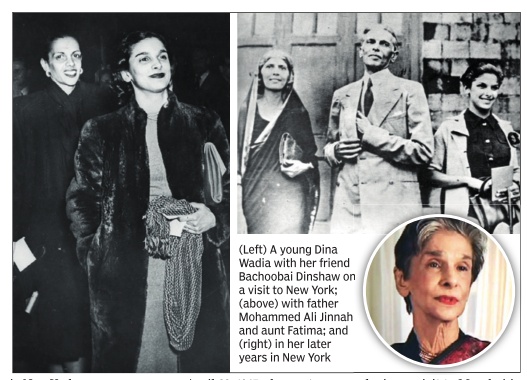Dina Wadia
This is a collection of articles archived for the excellence of their content. |
Personal life
Defied father to marry a Parsi
The fearless Wadia: Jinnah's daughter, Nusli's mother dead, November 3, 2017: The Times of India

From: The fearless Wadia: Jinnah's daughter, Nusli's mother dead, November 3, 2017: The Times of India
Dina Wadia, the only daughter of Mohammed Ali Jinnah, told him in the 1930s that she wanted to marry a young man named Neville Wadia from a prominent Parsi family of Bombay that had built the famous Cusrow Baug in Colaba and Jer Baug and Rustom Baug in Byculla, he was furious. “There are millions of Muslim boys in India,“ he told her, and she could marry anyone she chose. Dina promptly replied, “Father, there were millions of Muslim girls in India. Why did you not marry one of them?“ The young Jinnah had married a Parsi girl, Rattanbai “Ruttie“ Petit (she died in 1929). Dina Wadia, their only child and mother of Bombay Dyeing chairman Nusli Wadia, who stood up to her father by marrying Neville Wadia at a time when Jinnah was consolidating his position as the pre-eminent leader of India's Muslims and who later staked claim to Jinnah House at Malabar Hill as the Pakistan founder's “sole heir,“ passed away at her New York residence on Thursday. She was 98 and had been ailing for some time.
The London-born Dina spent a major part of her life in Mumbai but had been living in the US for the past few decades. Her industrialist son Nusli, who shared a close bond with her, had been shuttling between Mumbai and New York, spending a lot of time with her. Nusli had told TOI in 2008 that “I speak to my mother once a day every day no matter where I am... I don't think there is any mother-son relationship in the world as close as ours.“
Besides Nusli, Dina is survived by her daughter Diana, grandsons Ness and Jeh, and great-grandchildren Jah and Ella. Her funeral will be held in New York.
Dina was born a little after midnight on August 15, 1919 or, as Stanley Wolpert wrote in his book `Jinnah of Pakistan,' “precisely twentyeight years to the day and hour before the birth of Jinnah's other offspring, Pakistan“. As her parents' marriage floundered and her mother sunk into depression -Ruttie was ostracized by her family and the Parsi community for marrying Jinnah -the child was neglected to such a degree that for many years she wasn't given a name. She eventually took the name of her maternal grandmother, writes author Sheela Reddy in her book `Mr And Mrs Jinnah: The Marriage That Shook India'.
On November 16, 1938, she married Neville, the only son of Sir Ness and Lady Wadia, in a ceremony at All Saint's Church on Malabar Hill. Her father did not attend the ceremony . Dina and Neville had two children but a few years later, the couple separated.Later, she repaired her relationship with her father. On April 28, 1947, she wrote congratulating her father on winning Pakistan at least in principle. “I am so proud and happy for you -how hard you have worked for it,“ she wrote.But Dina didn't visit Pakistan until her father's funeral in Karachi in September 1948.
In 2004, Dina visited Jinnah's tomb in Karachi, along with Nusli and his two sons.In the visitors' book, she then wrote, “May his dream for Pakistan come true.“
Three years later, in 2007, she moved the Bombay high court challenging a 60-yearold notification of the Indian government that defined Jinnah House as `evacuee property .' She claimed the mansion could not be classified as `evacuee property' as her father had died intestate and demanded it be handed over to her. The government said Jinnah had willed the house to his sister Fatima on May 30, 1939. But Dina in her petition denied the existence of any such valid will. The petition still awaits final hearing and disposal.
In an interview to TOI during a visit to Mumbai in 2008, Dina had said, when asked about the bungalow, “Why do you keep calling it Jinnah House? That's the name the British gave it. Its real name is South Court.Why don't you refer to it by its original name?“ In her petition, she had stated that she wished to spend her remaining years in the house in Mumbai where she was born and where she spent her childhood years.
Wadia had then politely declined to answer any specific questions connected with the matter since it was in court. “I do not give interviews, never have,“ she said in her polished tone. “I like my privacy .“ She did divulge, however, that she met her son Nusli “every day“. “When you want to see someone, you don't have to stay with them.This is my choice. I never stay with my family ,“ she said, adding with a laugh, “They are, in any case, not all living in one building.“ She also said she doted on her great-grandson who was then “four years old.“